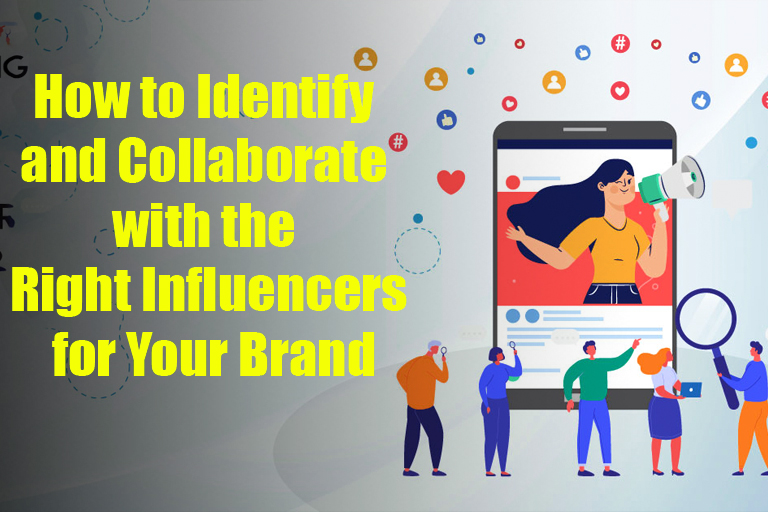Within the dynamic realm of digital marketing evolution, the synergy between brands and influencers has arisen as a potent tactic, enabling authentic connections with intended audiences. Capitalizing on the sway and expansiveness of personalities boasting substantial social media followings holds the potential to markedly amplify brand prominence, integrity, and interactivity. The pivotal factor, however, resides in the adept discernment and engagement of influencers harmonizing seamlessly with your brand ethos and aspirations. This composition undertakes an exploration of the fundamental measures to discern and join forces with fitting influencers tailored to your brand identity. Define Your Brand Objectives
Prior to delving into the realm of influencer partnerships, it is of utmost importance to possess a lucid comprehension of your brand’s aspirations. Are you inclined towards heightening brand recognition, catalyzing sales, or propelling a fresh product into the spotlight? Outlining your objectives will aid in refining the selection process for influencers who resonate with your mission and desired audience. As an illustration, suppose you represent a fitness-centric label gearing up to unveil a novel range of exercise attire; in that case, forging alliances with fitness aficionados and trainers would hold more pertinence than joining forces with fashion-oriented bloggers.
- Understand Your Target Audience
Knowing your target audience is paramount in influencer selection. Research and analyze your audience’s demographics, interests, behaviors, and preferences. This will guide you in identifying influencers whose followers closely resemble your ideal customers. An influencer’s audience should ideally match your target audience to ensure that your message resonates authentically and generates meaningful engagement.
- Seek Relevance and Alignment
Authenticity is the cornerstone of successful influencer partnerships. The influencers you collaborate with should have a genuine interest in your industry or product. Look for influencers whose content, values, and beliefs align with your brand. Their existing content should seamlessly integrate with your brand’s narrative, making the collaboration feel natural and unforced. An influencer who genuinely believes in your brand is more likely to create compelling and persuasive content.
- Evaluate Engagement and Reach
Although an influencer might boast an extensive following, it’s imperative to peer beyond mere figures. The engagement quotient, encompassing appreciations, remarks, distributions, bookmarks, offers invaluable discernment into the influencer’s adeptness at forging a bond with their spectators.An influence with a smaller but highly engaged audience can often yield better results than one with a massive but disengaged following. Tools and platforms like Social Bakers, Hoot suite, and Influence can assist in analyzing an influencer’s engagement metrics.
- Research and Vetting
Thoroughly researching and vetting potential influencers is a critical step. Scrutinize an influencer’s past collaborations, content quality, and overall online presence. Look for any controversies or negative associations that could potentially harm your brand’s reputation. Additionally, ensure that the influencer’s style and tone resonate with your brand’s identity.
- Leverage Influencer Platforms
In recent years, numerous influencer marketing platforms have emerged, simplifying the process of identifying and collaborating with influencers. Platforms like AspireIQ, Track, and Influence. co allows brands to search for influencers based on various criteria such as niche, audience size, engagement rate, and location. These platforms often provide detailed analytics and insights, making it easier to make informed decisions.
- Personalize Your Approach
When reaching out to potential influencers, avoid generic messages. Customize your communication to showcase your thorough investigation and sincere enthusiasm for cooperation. Emphasize the grounds on which you perceive the influencer as an ideal match for your brand, and elucidate how the collaboration might bring mutual advantages.
- Negotiate Transparently
Effective communication and transparency are key during the negotiation process. Clearly outline your expectations, deliverables, timelines, and compensation. The influencer must possess a thorough comprehension of their responsibilities and your anticipated outcomes. Engage in an open dialogue regarding remuneration particulars, whether it encompasses a fixed sum, performance-linked compensation, or a barter involving products.
- Creative Freedom and Collaboration
While it’s essential to communicate your expectations, it’s equally important to allow influencers creative freedom. Influencers know their audience best and understand what type of content resonates. Encourage open collaboration, where both parties contribute ideas to create content that seamlessly integrates your brand message with the influencer’s style.
9.Measure and Evaluate
After the collaboration is underway, closely monitor the performance of the influencer’s content. Track metrics such as engagement, reach, website traffic, and conversion rates. This data will help you assess the effectiveness of the partnership and whether it’s achieving your brand’s objectives. If the collaboration falls short of expectations, use the insights gained to adjust your approach in future partnerships.
10.Long-Term Relationships
Although isolated influencer initiatives might yield immediate outcomes, fostering enduring partnerships with influencers can offer consistent advantages over time.Consider forming partnerships that extend beyond a single campaign. Long-term collaborations allow influencers to develop a deeper understanding of your brand, which can lead to more authentic and impactful content. Additionally, returning collaborations can signal to the audience that the influencer genuinely believes in and supports your brand, enhancing credibility.
- Micro-Influencers and Nano-Influencers
When pondering over influencers, avoid fixating solely on individuals boasting hundreds of thousands or millions of followers. Embrace the potential of micro-influencers (those wielding a modest few thousand to tens of thousands of followers) and nano-influencers (typically commanding fewer than 10,000 followers), as they present unique and noteworthy benefits.. They often have a more engaged and niche audience, and their recommendations can carry significant weight. Collaborating with micro-influencers and nano-influencers can be cost-effective and yield impressive results, particularly for niche or localized campaigns.
Conclusion
In the rapidly evolving realm of influencer marketing, the intricate task lies in pinpointing and forming partnerships with the most suitable influencers. More than just the initial stages involving outlining goals, comprehending your target demographic, and delving into influencer analysis, brands must also possess flexibility and up-to-date knowledge. Through fostering sincere connections, embracing a variety of influencer archetypes, staying attuned to prevailing trends, and considering both local and global viewpoints, brands can confidently navigate the influencer domain, reaping substantial and enduring outcomes. Keep in mind, the collaboration with influencers transcends mere metrics; it involves establishing authentic bonds that deeply resonate with your audience, propelling your brand toward triumph in this digital era.
Read More:- Wearable Innovation: Developments in Wellness, Medical care, and then some
Read More:-The Job of Schooling in Encouraging Imagination and Advancement




